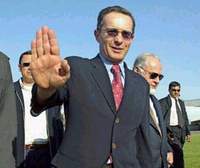Bush’s ally Uribe re-elected in Colombia
The law-and-order conservative president obtained 62 percent of the votes and will rule the South American country until 2010.

Colombia’s conservative president Alvaro Uribe was re-elected on Sunday after obtaining 62 percent of the votes in an election marked by a 54 percent of absenteesm. The law-and order leader will now rule until 2010, but will face the opposition of an ongroing center-left force that got almost 25 percent of the ballots for its candidate Sen. Carlos Gaviria.
Uribe’s victory is the first good news in years for the embattled US policy toward South America, where governments not alligned with Washington were elected recently. According to analysts, Washington is set to strengthening its ally's mandate to crack down on armed rebel groups.
With 85 percent of ballots counted, the conservative Uribe scored a stronger than expected 62 percent of the vote, according to official results. He easily surpassed the 50 percent needed to win in the first round and exceeded pre-election expectations. In second place, with 22 percent of the votes, was Sen. Carlos Gaviria of the leftist Alternative Democratic Pole party. Gaviria's strong support - a record outcome for the left - confirms the growing strength of the democratic left in this decidedly conservative South American nation. In third place was Horacio Serpa, of the century-old Liberal Party, with just below 12 percent.
"We're very happy with the results," Gaviria told Caracol Radio Sunday night after recognizing his defeat. "For the first time in the country's history, the main opposition party will be comprised of the democratic left." Sunday's vote took place amid relative calm -- underscoring one big reason Colombians backed Uribe. He is credited for bringing down crime rates and violence, and with overseeing an economic surge.
However, his critics say Uribe has showed a disinterest in social programs in a country with rampant poverty and fear his re-election we lead him to a strengthening of his alleged autocratic tendencies. Despite the macroeconomic surge, Uribe’s pro-market policies proved to be useless to fight poverty and reduce inequality.
But his hard-line policy against drug smugglers and rebel groups gave him enough support to overwhelm its rivals. For the first time in decades, the Armed Revolutionary Forces of Colombia, the FARC, asked the Colombian people to vote against someone. That one was uribe.
Uribe’s campaigned was marked with anti-guerrilla slogans backed by his "democratic security" agenda, which has put 25 percent more troops and police on the streets during four years in office. The program also increased defense spending to nearly double it, backed by military aid from the United States -- part of the anti-drug effort known as Plan Colombia that has cost $4 billion since 2000.
Also in favor of president Uribe, at least according to his supporters is the controversial peace agreement with far-right paramilitary groups. The deal demobilized some 30,000 members of the United Self-Defense Forces of Colombia, or AUC, who have handed in their weapons as part of a government-brokered amnesty deal with the landholder-backed paramilitary group.
Loved and hated by millions in South America’s second most populated country, Uribe will be the center of the Colombian politics for another four years, or maybe more, but as for today he is not considering rewriting constitution for a third term.
Hernan Etchaleco
Pravda.Ru
Subscribe to Pravda.Ru Telegram channel, Facebook, RSS!





